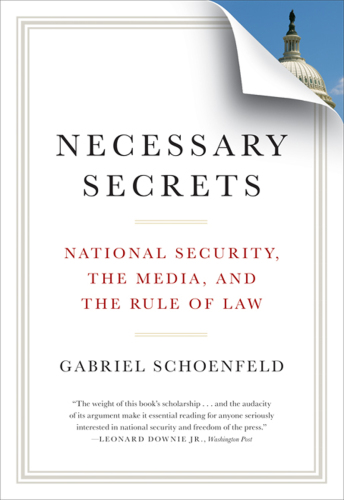
Necessary Secrets
National Security, the Media, and the Rule of Law
- اطلاعات
- نقد و بررسی
- دیدگاه کاربران
نقد و بررسی

March 22, 2010
The December 2005 publication of a front-page New York Times
piece about an NSA wiretapping program is the inciting incident at the heart of this provocative consideration of the conflict between the need for government secrecy and the role of a free press. Schoenfeld (The Return of Anti-Semitism
), senior fellow at the Hudson Institute, publicly accused the paper of violating the law when it published the article. Here, the author concerns himself less with the specifics of the 2005 incident than the larger theoretical and historical questions it raises. The book goes back to the First and Second Continental Congresses to show that the founders believed the defense of national security made complete transparency impossible. It then jumps ahead to the 1917 Espionage Act, the critical legislation, in Schoenfeld's thesis, locating where secrecy and security trump freedom of the press—as it did until Daniel Ellsberg's leak of the classified Pentagon Papers to the Times
. If Schoenfeld's argument sometimes feels one-sided, he succeeds in scrutinizing an issue of vital importance and putting it into a much broader context.

Starred review from March 15, 2010
A Hudson Institute scholar examines the enduring tension between the government's need to preserve certain secrets and the role of a free press.
In December 2005, basing its article on leaked documents, the New York Times reported the details of a National Security Agency program to tap al-Qaeda phone calls and e-mails, which the paper characterized as unambiguously illegal. President Bush called the decision to publish"shameful." Schoenfeld (The Return of Anti-Semitism, 2004) insists that the Times should have been prosecuted for this breach of security and for its subsequent decision to print the particulars of an intelligence program tracking terrorist financing. First Amendment absolutists, once apprised of the author's conclusion, will likely ignore the rest of the book—which is a shame, because they'll miss an intellectually muscular argument that chisels away at some cherished myths. Fully aware of the need for transparency in a vibrant democracy, and cognizant of the state's duty to protect its citizens, Schoenfeld understands that neither the government, with its inclination to overclassify and penchant for selective, self-interested leaking, nor the press, with its competitive imperatives, is a wholly clean actor in the ongoing contest between the public's right to know and its equally valid interest in security. As backdrop to his argument in favor of more stringent security and to legal proceedings that might extend to journalists, the author offers an efficient survey of famously unauthorized press disclosures, including the 1970s cases of Daniel Ellsberg and the 1985 case of Samuel Morison, the only successful prosecution—for reasons Schoenfeld makes clear—of a leaker in U.S. history. Throughout, the author relies on pertinent statutory and case law to demonstrate that the rules clearly contemplate criminal prosecutions covering journalists, notwithstanding any chilling effect on the press. Despite his predilections, Schoenfeld wisely counsels discretion, urging the government to distinguish between what's right and proper from what's wise and prudent, and for the press to understand that public tolerance of heedless behavior has limits.
A timely, sure-to-be controversial take on a problem that has no easy resolution.
(COPYRIGHT (2010) KIRKUS REVIEWS/NIELSEN BUSINESS MEDIA, INC. ALL RIGHTS RESERVED.)

May 1, 2010
In 2006, conservative commentator Schoenfeld published an editorial in which he called for the prosecution of certain New York Times journalists under espionage laws for reporting details of the National Security Agencys warrantless wiretapping activity within the U.S. With this selection, Schoenfeld reasserts his complaint against the Times in the context of a broader discussion about the historical role of secrecy in American government. Examining the Founders attitudes toward government secrets as well as certain precedent-setting incidents such as Daniel Ellsbergs release of the Pentagon Papers, he argues that the government should more aggressively assert its prerogative to control certain information, particularly that pertaining to national security, by prosecuting leakers and those who would publish sensitive leaked information. His primary frustration, however, is not with the governments demonstrated reluctance to prosecute leakers (often for fear of further disclosures in court) but with the confidently adversarial stance of post-Watergate journalism in general. Though uncovering some fascinating and largely forgotten moments in American historythe 1931 Black Chamber affair, for examplethis selection may put off some readers with its polemical tenor.(Reprinted with permission of Booklist, copyright 2010, American Library Association.)




دیدگاه کاربران